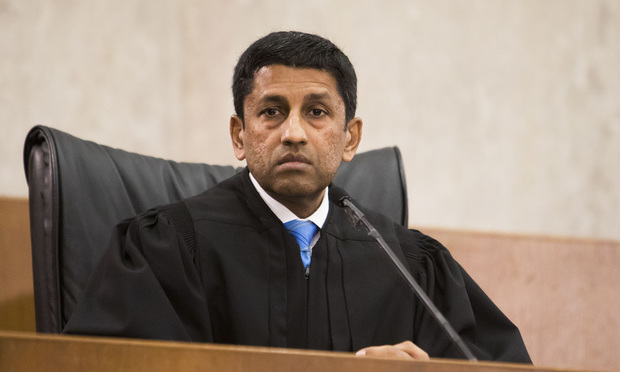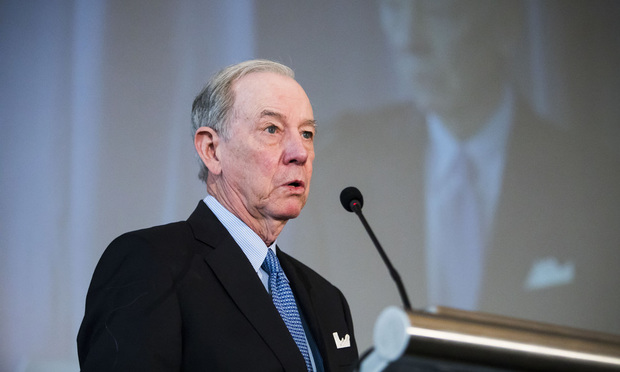DC Circuit Judges Feud, and New Suits Pile Up, as Shutdown Persists
Federal trial and appellate judges are grappling with requests from U.S. agencies to postpone cases, and new lawsuits are mounting that challenge the Trump administration's moves forcing federal employees to work without pay.
January 10, 2019 at 01:59 PM
5 minute read
 Judge Sri Srinivasan of the U.S. Court of Appeals for the D.C. Circuit on Dec. 14, 2017. Credit: Diego M. Radzinschi / ALM
Judge Sri Srinivasan of the U.S. Court of Appeals for the D.C. Circuit on Dec. 14, 2017. Credit: Diego M. Radzinschi / ALM
Federal trial and appellate courts are grappling ever more with requests from U.S. government agencies to postpone cases as the Trump administration's partial government shutdown enters record-setting territory for the number of days employees have been kept from their offices or forced to work without pay.
The U.S. Justice Department went to court in the days after the shutdown began in late December asking judges to postpone filing dates and hearing schedules until funding is restored to government agencies. Government lawyers argued they can only work in limited circumstances that involve human life and the protection of property. Some judges spurned those requests for delays, while others paused proceedings.
Down the street from the U.S. Capitol, two judges on the U.S. Court of Appeals for the D.C. Circuit argued with each other Wednesday—in a court ruling—about whether a hearing scheduled for Friday in a Federal Aviation Administration case should be postponed. Judge Sri Srinivasan, joined by Judge Harry Edwards, said the hearing must go on. Judge A. Raymond Randolph said there was no rationale for denying the FAA's request to postpone the argument.
Srinivasan pointed to the last major government shutdown, in 2013, when funding for agencies lapsed for nearly half of October. The government sought to delay at least 16 oral arguments then.
"Every one of those motions was denied; and every time, the government then participated in oral argument," Srinivasan wrote.
Randolph, in his dissent, said that holding the FAA argument Friday "is not a necessary response to some imminent threat to human life or property," as required by the Antideficiency Act. Randolph accused Srinivasan and Edwards of issuing an order "with no legal analysis."
 Judge A. Raymond Randolph, of the U.S. Court of Appeals for the D.C. Circuit speaking in 2018. Credit: Diego M. Radzinschi / ALM
Judge A. Raymond Randolph, of the U.S. Court of Appeals for the D.C. Circuit speaking in 2018. Credit: Diego M. Radzinschi / ALM"The majority's argument must be that because we have denied these stay motions in the past we should do so again. Charles Dickens had a few words about this form of argumentation: 'Whatever is is right'; an aphorism that would be as final as it is lazy, did it not include the troublesome consequence, that nothing that ever was, was wrong.'"
The federal judiciary has said it has enough money to continue paid operations at least through Jan. 18, one week later than initially estimated. "In an effort to achieve this goal, courts have been asked to delay or defer non-mission critical expenses, such as new hires, non-case related travel, and certain contracts. Judiciary employees are reporting to work and currently are in full-pay status," according to an advisory the Administrative Office of the U.S. Courts posted.
Meanwhile, lawsuits are mounting from federal employees and from unions representing government workers. Two cases were filed Wednesday in Washington's federal trial court challenging the Trump administration's move to force employees to work without pay. Other cases in the U.S. Court of Federal Claims are seeking back pay and other damages.
In one case in the trial court, the law firm Kator, Parks, Weiser & Harris sued on behalf of five anonymous government employees: two employees of the Justice Department; and one each from the U.S. Department of Agriculture, Department of Transportation and Department of Homeland Security. The suit did not say whether the Main Justice employees were lawyers, and the firm declined to comment.
The complaint seeks to "end the practice of forcing certain federal employees to work while in unpaid status during the government shutdown," according to a statement from the firm. The suit also challenges the block on federal employees from seeking outside employment during the shutdown.
The National Treasury Employees Union, represented by its in-house legal team, also filed suit Wednesday in Washington's federal trial court. The union said it represents 150,000 federal government employees across 32 agencies and departments, including the IRS, Treasury Department, National Parks Service and the Patent and Trademark Office.
The suit alleged the Trump administration has "purported to authorize agencies to require employees to work in a far broader range of circumstances than the Antideficiency Act allows."
The FBI Agents Association on Thursday sent a letter to the White House and congressional leaders calling for an end to the shutdown.
"As the shutdown continues, special agents remain at work for the American people without being paid, and FBI leadership is doing all it can to fund FBI operations with increasingly limited resources—this situation is not sustainable," the letter said. "The important work done by the bureau needs to be funded immediately."
Read more:
Government Shutdown Leaves Law Student Externs Scrambling
Federal Judiciary Says 'Limited Funds' Will Expire Jan. 18
Some Federal Judges Spurn DOJ's Push to Pause Cases During Shutdown
This content has been archived. It is available through our partners, LexisNexis® and Bloomberg Law.
To view this content, please continue to their sites.
Not a Lexis Subscriber?
Subscribe Now
Not a Bloomberg Law Subscriber?
Subscribe Now
NOT FOR REPRINT
© 2025 ALM Global, LLC, All Rights Reserved. Request academic re-use from www.copyright.com. All other uses, submit a request to [email protected]. For more information visit Asset & Logo Licensing.
You Might Like
View All
RFK Jr. Will Keep Affiliations With Morgan & Morgan, Other Law Firms If Confirmed to DHHS
3 minute read
Am Law 200 Firms Announce Wave of D.C. Hires in White-Collar, Antitrust, Litigation Practices
3 minute read
Trump Administration Faces Legal Challenge Over EO Impacting Federal Workers
3 minute readTrending Stories
- 1‘Ripe for SCOTUS’: Ruling Creates Circuit Split on NLRB’s Expanded Monetary Remedies
- 2'They Are Never Going to Learn': Geico Not Protected by Litigation Privilege
- 3Supreme Court Takes Up Case Over Approval of Religious Charter School
- 4Gifts of Interest in Charitable LLCs
- 5Workers' Attempt to Link H-1B Hiring to Tax Fraud Falls Short With 2nd Circuit
Who Got The Work
J. Brugh Lower of Gibbons has entered an appearance for industrial equipment supplier Devco Corporation in a pending trademark infringement lawsuit. The suit, accusing the defendant of selling knock-off Graco products, was filed Dec. 18 in New Jersey District Court by Rivkin Radler on behalf of Graco Inc. and Graco Minnesota. The case, assigned to U.S. District Judge Zahid N. Quraishi, is 3:24-cv-11294, Graco Inc. et al v. Devco Corporation.
Who Got The Work
Rebecca Maller-Stein and Kent A. Yalowitz of Arnold & Porter Kaye Scholer have entered their appearances for Hanaco Venture Capital and its executives, Lior Prosor and David Frankel, in a pending securities lawsuit. The action, filed on Dec. 24 in New York Southern District Court by Zell, Aron & Co. on behalf of Goldeneye Advisors, accuses the defendants of negligently and fraudulently managing the plaintiff's $1 million investment. The case, assigned to U.S. District Judge Vernon S. Broderick, is 1:24-cv-09918, Goldeneye Advisors, LLC v. Hanaco Venture Capital, Ltd. et al.
Who Got The Work
Attorneys from A&O Shearman has stepped in as defense counsel for Toronto-Dominion Bank and other defendants in a pending securities class action. The suit, filed Dec. 11 in New York Southern District Court by Bleichmar Fonti & Auld, accuses the defendants of concealing the bank's 'pervasive' deficiencies in regards to its compliance with the Bank Secrecy Act and the quality of its anti-money laundering controls. The case, assigned to U.S. District Judge Arun Subramanian, is 1:24-cv-09445, Gonzalez v. The Toronto-Dominion Bank et al.
Who Got The Work
Crown Castle International, a Pennsylvania company providing shared communications infrastructure, has turned to Luke D. Wolf of Gordon Rees Scully Mansukhani to fend off a pending breach-of-contract lawsuit. The court action, filed Nov. 25 in Michigan Eastern District Court by Hooper Hathaway PC on behalf of The Town Residences LLC, accuses Crown Castle of failing to transfer approximately $30,000 in utility payments from T-Mobile in breach of a roof-top lease and assignment agreement. The case, assigned to U.S. District Judge Susan K. Declercq, is 2:24-cv-13131, The Town Residences LLC v. T-Mobile US, Inc. et al.
Who Got The Work
Wilfred P. Coronato and Daniel M. Schwartz of McCarter & English have stepped in as defense counsel to Electrolux Home Products Inc. in a pending product liability lawsuit. The court action, filed Nov. 26 in New York Eastern District Court by Poulos Lopiccolo PC and Nagel Rice LLP on behalf of David Stern, alleges that the defendant's refrigerators’ drawers and shelving repeatedly break and fall apart within months after purchase. The case, assigned to U.S. District Judge Joan M. Azrack, is 2:24-cv-08204, Stern v. Electrolux Home Products, Inc.
Featured Firms
Law Offices of Gary Martin Hays & Associates, P.C.
(470) 294-1674
Law Offices of Mark E. Salomone
(857) 444-6468
Smith & Hassler
(713) 739-1250











